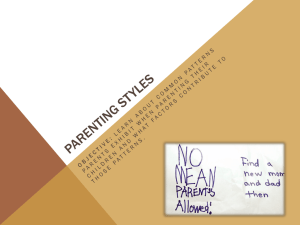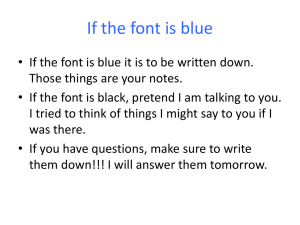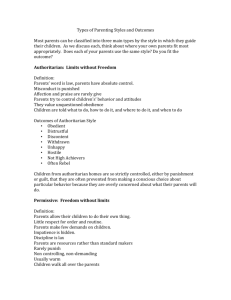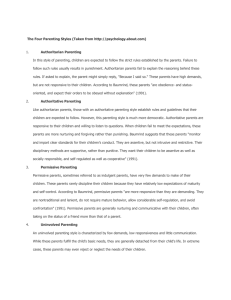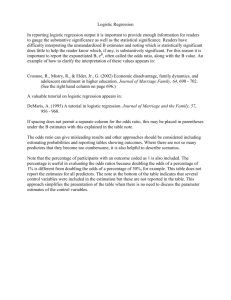Parenting Essay
advertisement
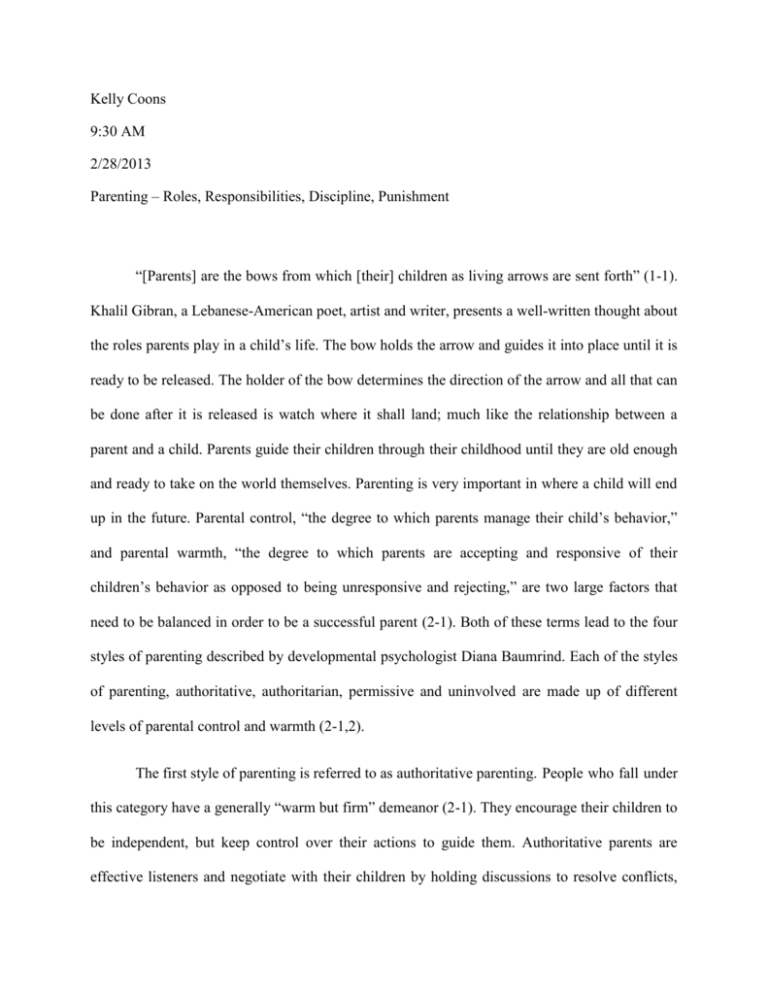
Kelly Coons 9:30 AM 2/28/2013 Parenting – Roles, Responsibilities, Discipline, Punishment “[Parents] are the bows from which [their] children as living arrows are sent forth” (1-1). Khalil Gibran, a Lebanese-American poet, artist and writer, presents a well-written thought about the roles parents play in a child’s life. The bow holds the arrow and guides it into place until it is ready to be released. The holder of the bow determines the direction of the arrow and all that can be done after it is released is watch where it shall land; much like the relationship between a parent and a child. Parents guide their children through their childhood until they are old enough and ready to take on the world themselves. Parenting is very important in where a child will end up in the future. Parental control, “the degree to which parents manage their child’s behavior,” and parental warmth, “the degree to which parents are accepting and responsive of their children’s behavior as opposed to being unresponsive and rejecting,” are two large factors that need to be balanced in order to be a successful parent (2-1). Both of these terms lead to the four styles of parenting described by developmental psychologist Diana Baumrind. Each of the styles of parenting, authoritative, authoritarian, permissive and uninvolved are made up of different levels of parental control and warmth (2-1,2). The first style of parenting is referred to as authoritative parenting. People who fall under this category have a generally “warm but firm” demeanor (2-1). They encourage their children to be independent, but keep control over their actions to guide them. Authoritative parents are effective listeners and negotiate with their children by holding discussions to resolve conflicts, K.Coons |2 which also proves to the child that their opinions are valued (2-1). Such parents create rules and guidelines for their children to follow, but they use a nurturing approach rather than strict punishment when doing so (3-1). Compared to other styles of parenting, authoritative parenting results in generally happier children with good emotional control, social skills and selfconfidence. The reason why this method is so effective is because parents act as role models to their children, which reinforces the behavior the parents wish to see from their children and internalizes it, making it almost habitual. The independence that authoritative parents allow their children boosts their self-esteem and self-confidence because they feel that they can do things on their own. “Child development experts generally identify the authoritative parenting style as the ‘best’ approach to parenting” (5-1). The second style of parenting, not to be confused with authoritative, is authoritarian parenting; these two styles are very different. Authoritarians are highly controlling and take a “because I said so” approach to parenting. They are very strict and use punishment frequently (21). Parents of this nature resemble dictators; when rules are set, children are expected to follow them precisely and failure to do so is followed by strict punishment. Authoritarians are not good listeners and do not feel it is necessary to explain why they, as the parent, said or did something. They feel that because they are the parent, they decide what happens and that it is a sufficient explanation for why they do the things they do (3-1). Children of authoritarian parents are generally very obedient; however, this is offset by the low self-esteem, social difficulty and sometimes aggressive behavior children express. These children might even be fearful and shy around other people. Since parents do not allow their children much room for independence, they often have little to no self-discipline and have a difficult time setting limits and personal goals. “While developmental experts agree that rules and boundaries are important for children to have, K.Coons |3 most believe that authoritarian parenting is too punitive and lacks the warmth, unconditional love and nurturing that children need” (4-1). Permissive parenting is another one of the four styles. Permissive parents are generally very warm and undemanding. Although this sounds comforting, it can lead to problems in the relationship between the child and the parent. Permissive people have the mindset that to show their child love, they must grant all of his or her wants. The word “no” is very seldom used and discipline is a rare occurrence (2-2). Permissive parents do not expect much from their children when it comes to self-control and maturity. They act in more of a friendly manner than they do as a parent to their children. Permissive parents are communicative and sometimes almost too nurturing (3-1). Rules and standards are minimal and inconsistent in a permissive parent’s household. Bribery is used in place of punishment when the child is misbehaving. Children of permissive parents lack the boundaries and guidance found in other households. They also have underdeveloped social skills and little to no self-discipline. The behavior in children is often disorderly and they usually do not do as well as other children in school academically. In fact, a study was recently performed which linked the effects of permissive parenting to underage alcohol use, drug use and general misconduct. It was said that teens who grew up in a permissive household were “three times more likely to engage in heavy drinking,” than other teens. The lack of structure and rules at home causes children to be reckless in all environments. They also are often immature due to the lack of maturity requirements from the parents which causes acceptance issues for the children in social settings (6-1). The final style of parenting is referred to as uninvolved. Much like it sounds, this type of parent does the very minimum in providing for their child. They have no warmth at all and can be characterized as self-centered. Their “I don’t care” attitude usually comes from being tired, K.Coons |4 frustrated or overwhelmed by the situation to the point of giving up; they feel as though their child is a bother to them. Uninvolved parents generally do not have much interaction time with their children and rarely consider how the child feels when making decisions regarding punishment or discipline. In extreme scenarios, the parents can be so uninvolved that it branches into neglect (2-2,3). In most cases though, the child is not in danger and the parent will fulfill the basic needs of the child. There is a major communication gap between uninvolved parents and their children, which comes from the unresponsiveness of the parents. In such a household, there is a general sense of overall detachment from a child’s life, whether it is school or activities the child participates in (3-1). There is little to no supervision in the home of uninvolved parents and their children because of the emotional distance, which refers to the lack of warmth, love and affection, between them. Children who are raised by uninvolved parents are most often underdeveloped in most areas of their life, including cognitive development, attachment and emotional and social skills. The difficulty forming attachment and relationships with other people come from the lack of trust and response from their parents. It is also difficult for children to learn what behaviors are appropriate during certain situations because of the unstructured lifestyle that they live at home and the fact that they have no sense of guidance from an authoritative figure; this is why children from uninvolved households often misbehave. Children of uninvolved parents learn how to fend for themselves, because their parents are not there to do it for them. Children will be more likely to experience anxiety and stress in their life and might also have issues depending on people. It is also true that children who were raised by uninvolved parents are at a higher chance of delinquency and substance abuse than other children (7-1,2). Questions arise when two parents have differing views when it comes to what style of parenting they feel is best. Aside from uninvolved parenting, the three main types of parenting, K.Coons |5 authoritative, authoritarian and permissive can help one another to be more effective. Of course the ideal and most effective method is authoritative because it is the most balanced blend of caring and structure, but this method unfortunately is not always practiced. Suppose one parent leans more towards the permissive side and the other towards the authoritarian style, maybe the two differing views will blend together to create a more equal balance. Parents with different viewpoints about how to raise their children should take action to come to a better understanding about what is best for their children and how to create that environment for them. “Barbara Fraiser, MSW, a licensed clinical social worker and therapist” suggests that parents seek counseling (8-1). Visiting a therapist can bring parents ideas together instead of them clashing. It can also make parents aware of how their childhood plays a role in the way they parent their children. By attending counseling, parents can come to agreements and learn how to parent their children in the most effective and healthy way. Another tip for parents is to keep arguments away from their children; parents should never encourage their child to “take sides.” Finally, reading about effective and successful parenting can help as well (8-1). It is apparent that the way children are raised plays a very important role in who they grow up to be and what kind of personality they have. The four styles of parenting, authoritative, authoritarian, permissive and uninvolved are all very different from one another and offer very different outcomes. The most ideal style of parenting is authoritative because of it’s well balanced ratio of rules and discipline to independence and nurture. Authoritative parents have adequate parental control over their children and express a strong sense of parental warmth. These two factors play a large part in the roles of parents and when balanced correctly, they are the key to successful parenting. Parents should look at themselves as the bow in a child’s life K.Coons |6 where the child represents the arrow. Parents must guide their children in the right direction, because once they let them go, they can only watch them land. K.Coons |7 Works Cited 1. Famous Kahlil Gibran Quotes 2. Parenting Styles and Adolescents 3. Parenting Styles 4. What is Authoritarian Parenting? 5. What is Authoritative Parenting? 6. What is Permissive Parenting? 7. What is Uninvolved Parenting? 8. When Parenting Styles Differ
